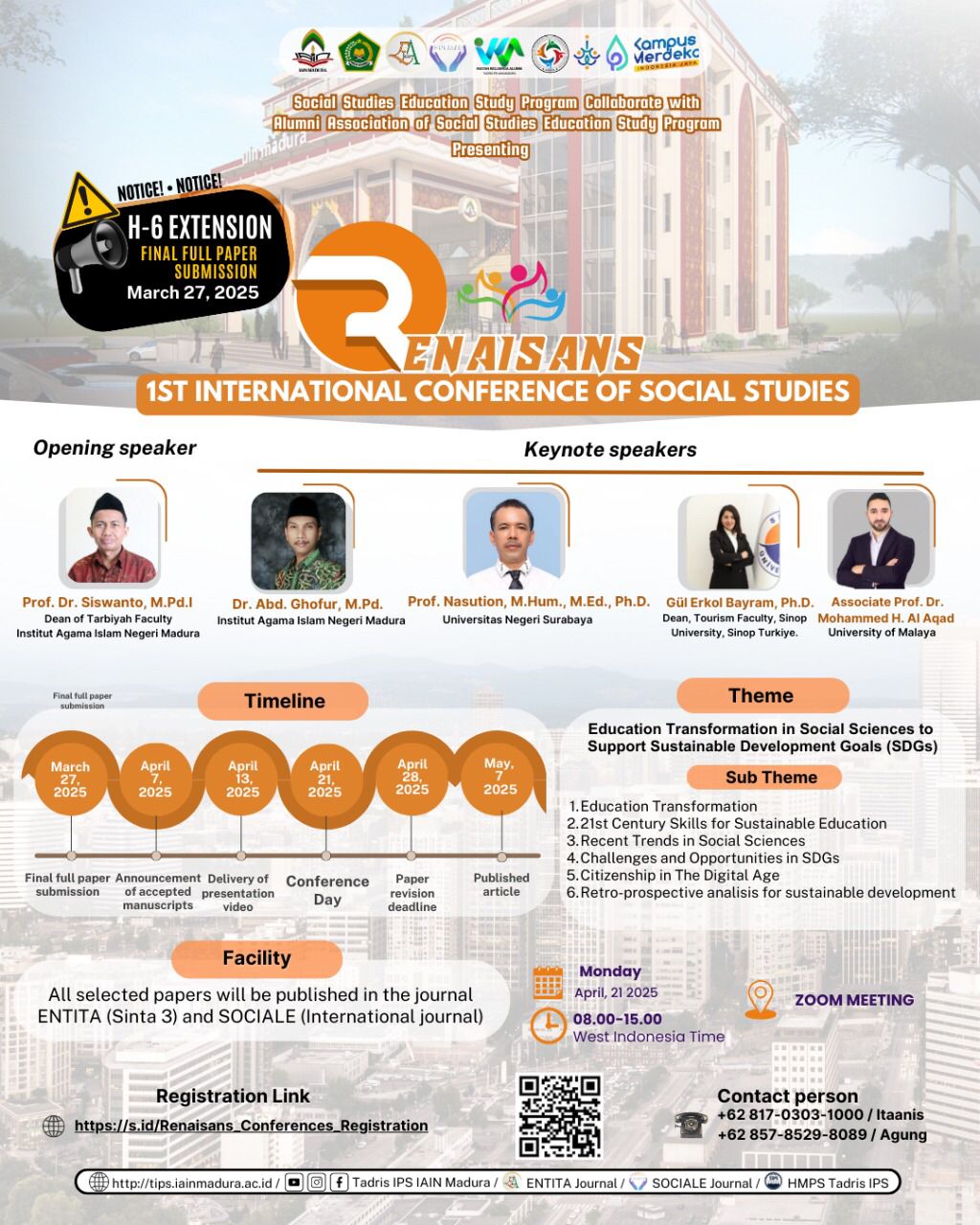Analisis Kesiapan Guru Madrasah dalam Insersi Kurikulum Cinta
 Abstract views: 8
,
Abstract views: 8
,
 PDF (Bahasa Indonesia) downloads: 9
PDF (Bahasa Indonesia) downloads: 9
Abstract
Character-based education is crucial in shaping a generation that is not only academically intelligent but also possesses strong moral values. One approach applied at MI Nururrahmah is the Kurikulum Cinta, which aims to instill values such as love, empathy, tolerance, and justice. Although this curriculum has been implemented, there are various obstacles and challenges in the process. This study aims to analyze the implementation of Kurikulum Cinta at MI Nururrahmah, including the obstacles faced, the potential available, and the support needed to optimize its implementation. This research uses a descriptive qualitative approach with data triangulation techniques through interviews, observations, documentation, and questionnaires distributed to the teachers of MI Nururrahmah. The data obtained is analyzed to identify the barriers, potential, and support in the implementation of Kurikulum Cinta. The results show that although Kurikulum Cinta has been well implemented, there are some obstacles, such as egoistic attitudes in some students and limitations in time and learning facilities. However, support from the head of the madrasah and active involvement of parents provide great potential to strengthen the implementation of this curriculum. Teacher training programs also play an important role in improving the quality of value-based teaching. Kurikulum Cinta at MI Nururrahmah has shown positive results in shaping students' character, despite some challenges in its implementation. More varied strategies, increased support from parents and the head of the madrasah, as well as improvements in facilities and teacher training, are needed to maximize the implementation of this curriculum.
Downloads
References
Chintya, R., & Sit, M. (2024). Analisis Teori Daniel Goleman dalam Perkembangan Kecerdasan Emosi Anak Usia Dini. Journal of Psyehologi and Child Development, 4(1), 159–168. https://doi.org/10.37680/absorbent
Hasanah, & Salmi, S. (2017). Nilai Edukasi Kasih Sayang dalam Kehidupan Rumah Tangga Rasulullah SAW. Jurnal Dedikasi, 1(2), 184–192.
Muhammad Muttaqin. (2021). Konsep Kurikulum Pendidikan Islam. TAUJIH: Jurnal Pendidikan Islam, 3(1), 1–16. https://doi.org/10.53649/taujih.v3i1.88
Nurhayati, I., Sa’ari, M. H., Deny, M., Firmanulloh, & Hermansyah, S. (2023). Konsep Keadilan dalam Perspektif Plato. Nusantara: Jurnal Pendidikan, Seni, Sains Dan Sosial Humanioral, 1(1), 1–25. https://doi.org/10.11111/nusantara.xxxxxxx
Oktaviani, N. P. S., & Sukmantara, N. (2019). Konsep Cinta Menurut Mahatma Ghandi. Vidya Darsan, 1(1), 41–53.
Permana, M. Z., & Riyani, P. (2023). TOLERANSI; Sebuah Konsep Psikologi. 15(2), 93–103.
Rismi, R., Suhaili, N., Marjohan, M., Afdal, A., & Ifdil, I. (2022). Bimbingan kelompok dalam pemahaman nilai empati untuk meningkatkan sikap prososial siswa. Jurnal EDUCATIO: Jurnal Pendidikan Indonesia, 8(1), 14. https://doi.org/10.29210/1202221496
Suhendro, E., & Syaefudin, S. (2020). Nilai-Nilai Kemanusian Dalam Pendidikan Anak Usia Dini Inklusi. JEA (Jurnal Edukasi AUD), 6(1), 1. https://doi.org/10.18592/jea.v6i1.3430
Umam, M. C. (2019). IMPLEMENTASI TEORI BELAJAR HUMANISTIK CARL R. ROGERS PADA PEMBELAJARAN PENDIDIKAN AGAMA ISLAM. TADRIB : Jurnal Pendidikan Agama Islam, 5(2), 247–264.
Wahyuni, N., & Fitriani, W. (2022). Relevansi Teori Belajar Sosial Albert Bandura dan Metode Pendidikan Keluarga dalam Islam. Qalam: Jurnal Ilmu Kependidikan, 11(2), 60–66. https://doi.org/10.33506/jq.v11i2.2060
Copyright (c) 2025 Entita: Jurnal Pendidikan Ilmu Pengetahuan Sosial dan Ilmu-Ilmu Sosial

This work is licensed under a Creative Commons Attribution-NonCommercial 4.0 International License.
ENTITA: Jurnal Pendidikan Ilmu Pengetahuan Sosial dan Ilmu-Ilmu Sosial operates an Open Access policy under a Creative Commons Non-Commercial 4.0 International license. Authors who publish with this journal agree to the following terms:
- The copyright of the received article once accepted for publication shall be assigned to the journal as the publisher with licensed under a

- Journal is able to enter into separate, additional contractual arrangements for the non-exclusive distribution of the journal's published version of the work (e.g., post it to an institutional repository or publish it in a book), with an acknowledgement of its initial publication in this journal.
- Journal is permitted and encouraged to post their work online (e.g., in institutional repositories or on their website) prior to and during the submission process, as it can lead to productive exchanges, as well as earlier and greater citation of published work (see The Effect of Open Access).
- Here is Copyright Transfer Form that author can download and send to OJS during submission.

















